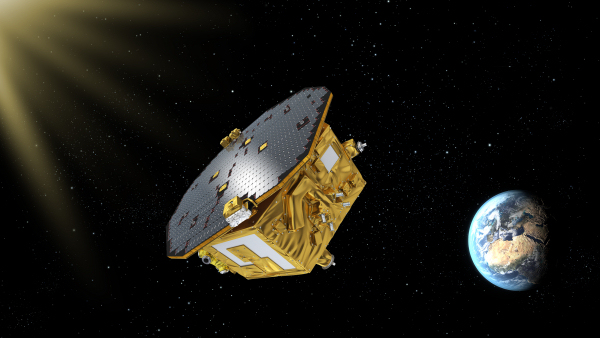LISA Pathfinder wins American Astronautical Society award
24 January 2018
ESA's LISA Pathfinder mission has been honoured with the 2017 Space Technology Award of the American Astronautical Society. |
| LISA Pathfinder in space. Credit: ESA/C. Carreau |
LISA Pathfinder, launched in December 2015 and operated between March 2016 and June 2017, has paved the way for future missions by flight-testing the concept of gravitational wave detection from space.
The awards were announced earlier this week as part of the society's annual awards bestowed for meritorious accomplishments during the previous year, or not previously honoured by them.
"AAS is excited to honour these individuals and programmes for their remarkable achievements and accomplishments," said Carol Lane, AAS President. "Their work is truly deserving of recognition and we at AAS thank and congratulate all of the winners who have each advanced space flight and exploration."
The Space Technology award, established to recognise an outstanding achievement in space technology, was given to the international LISA Pathfinder team for "delivering and operating a novel spacecraft that clearly demonstrated that a space-based observatory of gravitational waves is within our technical reach".
Gravitational waves, ripples in the fabric of spacetime, are produced by the acceleration of massive objects and can be generated by a wide range of cosmic phenomena, from supernova explosions to neutron star binaries spiralling around each other, and pairs of merging black holes.
LISA Pathfinder hosted two test masses, linked by a laser interferometer, at the core of one spacecraft, and employed several sets of micronewton thrusters to nudge the spacecraft and keep it centred around them. The mission demonstrated that it is indeed possible for the test masses to be virtually motionless with respect to each other.
Such a noise-free environment is essential in order to measure any possible distortion caused by a passing gravitational wave, which affect the fabric of spacetime on the minuscule scale of millionths of a millionth of a metre over a distance of a million kilometres.
The mission surpassed all expectations, setting the stage for the development of ESA's LISA mission, a space-based constellation of three spacecraft, with launch planned for 2034.
The full list of AAS winners is provided here. The winners will be invited to collect their awards at the 2018 Robert H. Goddard Memorial Symposium in March. More about LISA Pathfinder's trail-blazing mission.
LISA Pathfinder was an ESA mission with important contributions from its member states and NASA. The LISA Technology Package payload was delivered by several national funding agencies and ESA, in particular: Italy (ASI); Germany (DLR); the United Kingdom (UKSA); France (CNES); Spain (CDTI); Switzerland (SSO); and the Netherlands (SRON). LISA Pathfinder also carried the Disturbance Reduction System payload, provided by NASA-JPL.
For more information, please contact:
Paul McNamara
LISA Pathfinder Project Scientist
European Space Agency
Tel: +31 71 565 8239
Email: paul.mcnamara![]() esa.int
esa.int
Stefano Vitale
LISA Technology Package Principal Investigator
University of Trento and INFN, Italy
Tel: +39 046 128 1568
Email: stefano.vitale![]() unitn.it
unitn.it
Karsten Danzmann
LISA Technology Package Co-Principal Investigator
Max Planck Institute for Gravitational Physics (Albert Einstein Institute) and Leibniz University, Hannover, Germany
Phone: +49 511 762 2356
Email: Karsten.Danzmann![]() aei.mpg.de
aei.mpg.de
